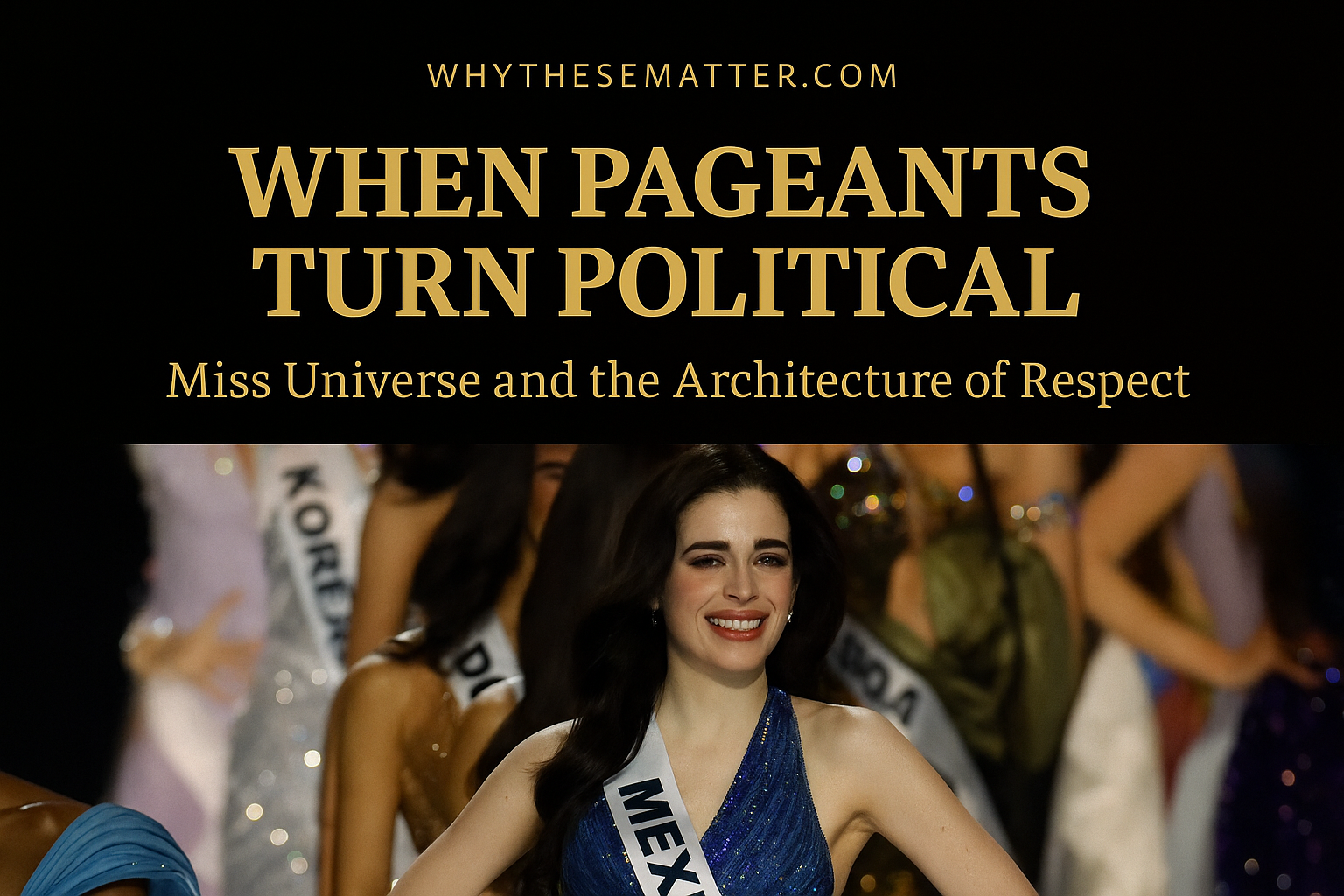A walk-out at the Miss Universe 2025 orientation in Thailand reveals that modern pageantry is no longer about beauty—it’s about human dignity, agency, and the design of respect. This moment offers a blueprint for how global culture must recalibrate its structures of representation. “I’m here representing a country and it’s not my fault that you have problems with my organisation.”— Fátima Bosch, Miss Universe Mexico

When dozens of contestants at the Miss Universe 2025 orientation in Bangkok walked out after the event organiser berated Miss Mexico, Fátima Bosch, the moment sent ripples far beyond the ballroom. During the ceremony, Thai host Nawat Itsaragrisil publicly called Bosch a “dummy” for allegedly refusing a photo-shoot. The clip—quickly shared by People Magazine—ignited outrage, leading several delegates to leave in protest.
But this was more than drama. It was a real-time test of what I call the architecture of respect—the invisible framework that determines who is heard and who is handled. In an era where representation is commodified, the question becomes: What happens when symbols refuse to stay silent?
Pageants are not pageants—they’re systems. Behind the sequins lies a hierarchy of power, production, and performance. Bosch’s defiance—declaring “I have a voice”—shifted the structure from delegate as asset to delegate as agent.
The footage of the incident, which flooded Mexico News Daily and TikTok within hours, demonstrated how design thinking now plays out live. The walk-out wasn’t rebellion—it was reconfiguration. Contestants collectively redesigned the event’s operating logic: participation without dignity is no longer acceptable currency.
What many miss is that this was design activism in real time. These women re-architected the user interface of global pageantry—turning the sash into a statement of conscience.

Respect, when stripped of glamour, is fundamentally per
mission: the right to define one’s own boundaries. Itsaragrisil’s remark—“If you follow your national director you are a dumbhead,” reported by New York Post—revealed a cultural relic: the expectation of obedience disguised as opportunity.
Bosch’s composure shattered that logic. Her response—“You are not respecting me as a woman”—wasn’t defensive; it was declarative. She named what so many endure silently. In that single sentence, she reframed beauty as an instrument of truth.
When design ignores agency, it creates oppression in sequence. Respect is not kindness—it’s structure. And structure, once redesigned, cannot return to ignorance.
To wear a crown is not to hold power; it is to carry its projection. Yet Bosch’s defiance flipped that projection back at the system. When Miss Universe Organisation later distanced itself from Itsaragrisil, the message was clear: reputational design now includes moral design.
That evolution matters. Institutions that depend on pageantry—corporate, political, religious—are all facing the same structural audit:
Are you building for dignity or display?
As someone who has represented nations on the stage—first as Mister Global Nigeria and later as Mister Grand Sea Universe, where I was honoured with Best Model of the Year, Best Face of the World, and Best National Costume—I’ve lived the paradox of pageantry: the spotlight and the silence.
You learn posture, discipline, choreography. You learn diplomacy through smiles. But you also learn that applause can sometimes mute authenticity. That’s why Bosch’s stand resonated so deeply—it wasn’t about rebellion; it was about reclaiming authorship.
In every system built on image, there is a moment when someone must remind the architects that the frame does not own the portrait.

Today’s pageant is a hybrid organism—part show, part social feed, part corporate brand. The walk-out spread instantly across the algorithmic globe. Virality became protest.
Yet virality, without follow-through, risks becoming empathy’s placebo.
The true test lies ahead: whether Miss Universe will structurally redesign its protocols of respect—implementing grievance channels, safeguarding psychological wellbeing, embedding consent training—or whether the spectacle simply resumes.
When culture depends on optics, accountability becomes the most radical act of design.
Because this incident isn’t about crowns—it’s about culture. It asks whether empowerment can survive commodification.
Pageants reflect the systems that build them: governments, corporations, religions, media. If a contestant cannot demand respect in a ballroom, how can a citizen demand justice in a parliament?
When women—and men—stand up mid-ceremony and walk out, they model a future of participatory dignity. They remind us that beauty was never the point. Presence was.
And that presence, when used with courage, redesigns institutions.
Makaila Frost is an American legal theorist and cultural designer writing for Why These Matter. Her essays explore digital justice, moral frameworks for innovation, and the intersection of power, representation, and respect in global culture.

At the intersection of brain chemistry and human longing, intimacy between men reveals a landscape of vulnerability, reward, and identity. This article delves into how neural circuits, hormonal dynamics, and psychological frameworks undergird male-male intimacy—why it matters, why it unsettles, and why it offers one of the deepest paths to self-knowledge and human connection. By combining neuroscience, endocrinology, and relational psychology, this piece argues that male intimacy is not a peripheral luxury but a core human imperative: a frontier where biology and spirit collide.

AI is reshaping medicine from diagnostic tool to empathic collaborator — a transformation that redefines care, ethics, and the essence of healing itself.

Across alliances, borders, and institutions, power is increasingly exercised without trust. This article examines how legitimacy—not military strength or economic size—has become the decisive variable in global stability, and why its erosion now threatens international order.